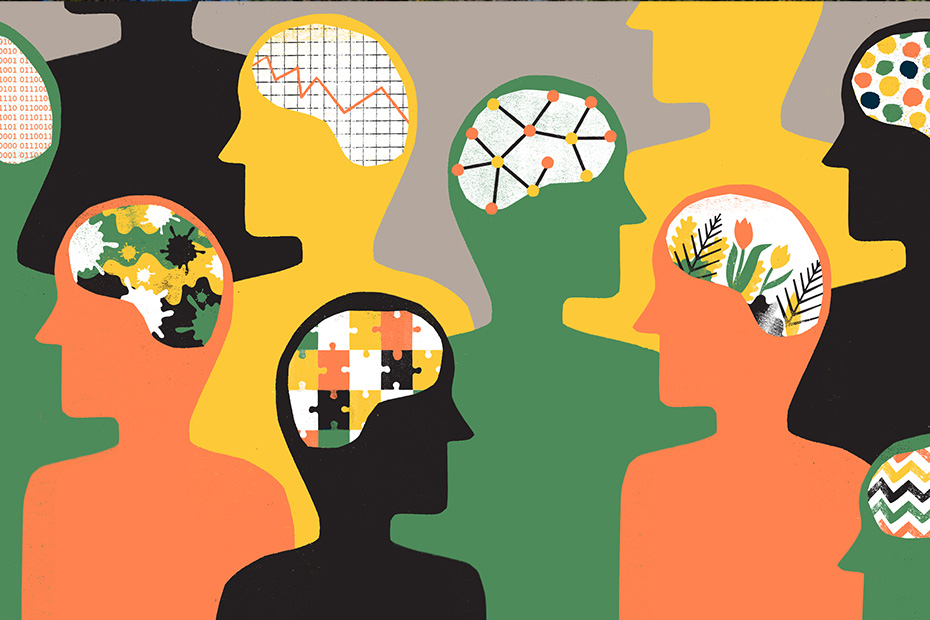新闻和故事
All stories
Stories that highlight the people and programs making healthcare more accessible across Oregon.
Company highlights
The innovative programming and achievements that reflect our commitment to quality care.
CareOregon culture
A look inside the people and values that make CareOregon a compassionate workplace.
Community impact
Partnerships and programs that strengthen health and wellbeing across Oregon communities.
Health and wellness
Tips and insights to support physical and emotional wellbeing for our members.
神经多样性:了解优势和影响

- trending health
“神经多样性”是指由于感官、运动、社交、情绪、认知或神经系统差异而自然产生的多样化大脑功能和行为方式。每个人都可以被视为神经多样性谱系当中的一员,但专家可能会将个体划分为神经多样性和神经典型性。神经多样性个体在大脑和行为方面的变异超出了典型范围。
美国人口中有20%属于神经多样性人群,其中包括那些被诊断为注意力缺陷多动障碍(ADHD)、自闭症、阅读障碍、强迫症(OCD)、妥瑞氏症等的人。
虽然一些环境因素——如脑损伤或创伤——也会导致神经多样性,但在大多数情况下,神经多样性的最初迹象出现在童年时期,因为神经和学习障碍可能具有遗传性。在阅读、写作、行为和情绪方面出现的早期挑战可能是神经多样性的特征指标。成年后,这些挑战仍可能成为巨大障碍。
These differences are very common, but they can be ignored or “othered” in our society. ADHD, for example, shows up in approximately 7 million U.S. children ages 3-17 and typically co-occurs with another behavior or conduct, learning or mental health condition. For many adolescents, school is often a place where neurodiversity is accepted as part of ‘identity’ among peers, but schools and workplaces are not often designed to accommodate unique needs. As a result, individuals might experience challenges in communication, socializing or environmental stimulation, which can lead to stress, trauma or mental health concerns.
然而,神经多样性群体同样拥有广泛的才能、创造力和视角。思考、学习或行为并没有所谓的“正常”方式——接受神经多样性身份或诊断可以促进个人的健康福祉。
如何为神经多样性群体发声
“Diversity” is in the name—and it’s essential to recognize that everyone takes on challenges in a different way. Mutual respect and understanding differences are key.
以下是几种倡导方式:
- Recognize that neurodivergence is a spectrum. Common patterns that may appear in individuals with neurodivergence include impulsivity, sensory or emotional overloading, self-isolation, lack of physical contact and hyper-fixation. Family, friends and partners can support individuals with neurodivergence by maintaining awareness, listening intently and adapting communication where needed.
- Encourage individuals to seek professional support. Many go undiagnosed but may still be experiencing thoughts or behaviors that could cause significant impacts. Acknowledging neurodiversity is important to avoid conflicts, build crucial resources and promote healthier relationships.
- Be careful with media representations of neurodiversity. Social media, for example, often creates misunderstandings or simplification of diagnoses, which can be more harmful than beneficial.
- Adapt approaches where needed. Interventions for individuals with neurodivergence are not one size fits all. Leaders in schools and workplaces can support individuals through accommodations, including quiet spaces, fidgets, notice of schedule changes, verbal and written instructions, flexible seating and more. Accommodations are critical to providing an equitable workspace free from stigma—and ultimately benefit everyone.
- Be aware of cultural stigma or biases. Social norms, or expectations, can influence how individuals express these patterns and how others respond to them. Stigmas are still very prevalent in our society and culture, and these interfere with access and resources, making day-to-day life harder.
- Use first person language. Try saying “a person with autism” or “she has disclosed her OCD.” Avoid “disabled” or “disadvantaged” to describe groups, unless preferred.
以体贴和富有同理心的方式支持神经多样性个体并促进彼此之间的协作,可以极大地增进人际关系。神经多样性个体以其独特的方式处理和体验周遭事物,这会带来全新的视角,进而催生创新的想法和解决方案。他们的贡献拓展了我们的集体认知,并为应对挑战和抓住机遇提供了新的途径。通过积极邀请神经多样性个体发表意见和想法并予以重视,可以为整个社会带来更加丰富的观点和认识。此外,为神经典型性个体配备适当的工具和支持,可以增强他们与神经多样性同事有效互动和协作的能力,从而为所有人创造出一个更具包容性和活力的环境。
Seeking mental health resources? Visit our website at careoregon.org/mental-health.
CareOregon是一个具有包容性的工作场所,并且以此为傲。如果您想加入我们的团队,可以在careoregon.org/careers查找最新职位空缺。
